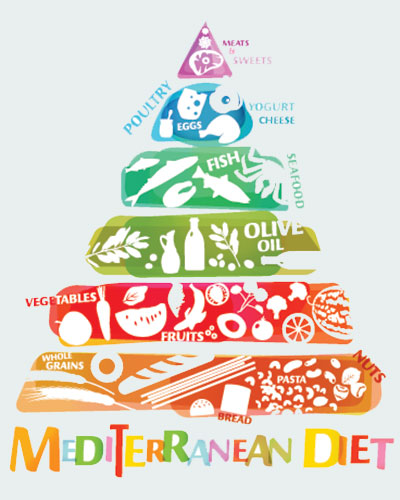Time and again the Mediterranean diet has emerged as the best diet amongst the social media worthy diet fads like keto or intermittent fasting. The US News and World Report have granted the Mediterranean diet the first spot in several food and diet classifications including, the best diet for nutritious eating, best plant-based diet, the best diet for diabetes, and easiest diet to follow.
A Mediterranean diet is not only good for your body but is also easy to follow without having to give up the food you love, and that includes desserts. Furthermore, you do not need to journal everything you eat or eat within set time frames.
Let us first understand what a Mediterranean diet is. Simply put, it is a typical food practice followed by the dwellers of the entire basin of the Mediterranean Sea. Not only does it consist of Greek or Lebanese food, but also cuisines from countries and regions further away from the Mediterranean Sea than you would expect, such as Spain, Israel, Syria, and North Africa, to name a few.
The focus of this diet is to eat more whole foods such as fruits and vegetables while avoiding highly processed foods. You can consume three meals and one snack daily, provided your meals are plant-based, contain protein, and a little dairy. According to the American Heart Association, a Mediterranean diet is exemplified by fruits, vegetables, nuts and seeds, olive oil, little dairy, a small quantity of fish, poultry and eggs, and an even smaller quantity of red meat.
If you want to follow a real Mediterranean diet, you could get started with the following suggestions:

Fruits and Vegetables: 2 servings of fruits and 2 servings of vegetables per day (1 serving = ½ cup cooked or 1 cup raw). You can have at least 1 serving at each meal or as a snack.
Legumes (Beans and Lentils): 3 servings per week (1 serving = ½ cup). Add to salads and soups. Try hummus or bean dip for vegetables.
Extra Virgin Olive Oil: Extra-virgin olive oil is the fat of choice in the Mediterranean Diet. Consume at least 1 Tbsp per day (not more than 4 Tbsp per day). Drizzle on salads, cooked vegetables, pasta or as a dip for bread.
Fish: 3 servings per week (1 serving = 85 to 100 grams). Eat fish rich in Omega 3 like salmon, sardines, herring, tuna, and mackerel.
Nuts: Nuts and seeds are a staple in a Mediterranean Diet. Eat at least 3 servings per week (1 serving = ¼ cup). Eat nuts raw, unsalted, and dry roasted alone or with a dried fruit as a snack. Best nuts to eat are walnuts, almonds, and hazelnuts. Whole Grains and Vegetables with starch (potatoes, peas & corn): 3-6 servings per day (1 serving = ½ cup cooked, 1 slice of bread). Choose oats, barley, quinoa, brown rice, or a baked or roasted red skin or sweet potato. Eat whole-grain bread, cereal, couscous, and pasta.
Meat: Choose skinless white meat instead of dark meat. Eat it baked, broiled, or grilled. Not more than 1 serving per week of red meat (Beef, Veal, and Lamb. 1 serving = 85 grams). Limit to lean cuts, like tenderloin, sirloin, and flank steak.
Dairy and Eggs: Eat Greek yoghurt as it contains almost double the protein of regular yoghurt, and is a great source of calcium, vitamin B12, potassium, and probiotics. Limit cheese to 3 servings per week. There is no limit on egg whites but eat egg yolks in moderation. Choose fat-free milk, Greek yoghurt, and cottage cheese. Avoid whole-milk dairy, cream, and cream-based sauces and dressings.
Baked Goods and Desserts: Avoid commercially baked goods, sweets, and desserts. Limit homemade goods to less than three times per week. Instead, choose fruit and non-fat yoghurt. Use whole-grain flour instead of bleached or enriched flour and egg whites instead of whole eggs.
In a nutshell, when you start a Mediterranean diet you should:

- Eat in plenty: fruits, vegetables, bread and whole grains, legumes, potatoes, beans, nuts, seeds, fish, and seafood. Olive oil serves as the primary fat source.
- Eat in moderation: Poultry, eggs, cheese, and yoghurt.
- Eat rarely: Red meat.
- Do not eat: Sugars, sugary beverages, sodium, highly processed foods, refined carbohydrates, saturated fats, and fatty or processed meats.
It is important to ensure that you get at least 50 per cent of your carbohydrates from vegetables, fruits, legumes, and whole grains; 35 per cent fats from healthy oils, nuts, seeds, and fish, and 15 per cent protein from legumes, fish, nuts, dairy, poultry, and eggs.
The Mediterranean diet is considered one of the healthiest ways to eat. Studies have shown that it can help in reducing the risk of heart disease, metabolic syndrome, diabetes, certain cancers, as well as depression.
If you have been looking to alter your diet and bring about a change in your lifestyle, now is just the time for you to indulge in the Mediterranean diet. Use the guide you just went through to get started and you will be reaping its benefits in the long term!
